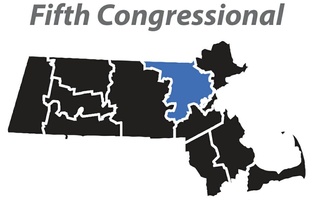Amidst mounting anticipation surrounding the presidential election, Nina Perales, an advocate for Mexican-American rights, told audience members Thursday that minority voting rights are still not universally respected.
“[There is] a real fear about Latino growth and Latino voting,” Perales, who is vice president for litigation at the Mexican American Legal Defense and Education Fund, said at a talk at Harvard Law School. She added that this fear has manifested itself in voter identification laws and Congressional districting plans that infringe on Latino choice.
Launching into a discussion on gerrymandering, Perales presented the audience with a map of Texas’s Congressional District 26. For the most part, Congressional District 26 is a square, but it has a skinny appendage on its southern side.
“That’s what we call the lightning bolt,” Perales said.
The lightning bolt portion of Congressional District 26 is predominantly Latino, she said. In order to dilute the Latino vote, Perales said, politicians have added this lightning bolt to a district full of “Anglo” voters.
Texas’ 23rd Congressional District, Perales said, is another example of how politicians can draw Congressional districts to lessen the impact of minority voters.
“They made [District 23] a Latino-majority district where Latino choice would not win,” she said. “They made sure Latinos were low-turnout, low-efficacy voters.”
In addition to districting schemes, Perales has found herself battling the various voter identification requirements that some states have enacted in recent years.
“People are convinced that there are all sorts of non-citizens voting, which isn’t true,” Perales said.
According to Perales, the effect of photo identification requirements is not to prevent voter fraud, but rather to keep Latino citizens, particularly young Latino citizens, from the polls. Perales discussed two young Latino women who interned at her office.
“They don’t have driver’s licenses because they come from low-income families,” she said. “Their insurance premiums would double.”
A common theme in Perales’s presentation was that the Republicans and Democrats were both at fault for the marginalization of Latino voters.
“They slice and dice minority districts in whatever way is best for them,” Perales said.
“I think the most important thing that she talked about is the idea of Latino choice and majority choice,” said Noah B. Kaplan, a student at Harvard Law School who attended the event. “It’s not about electing people of a particular party or a particular color but about giving voters the opportunity to elect the candidate of their choice.”
For Jessica K. Gorman, a Law School student from New Zealand, Perales’ lecture was an introduction to gerrymandering and the marginalization of minorities.
“At home, there’s never been talk that the boundary drawing has been done to include or exclude certain populations,” said Gorman.
However, for Kaplan, a Houston native, the lecture touched on issues which she said were all too familiar.
“I think she’s doing some really great work, because given the opportunity, the political system there will disenfranchise Latino voters, African-American voters, and pretty much whoever else they can,” he said.
Read more in News
Alum Exhibits Photos of IndiaRecommended Articles
-
A Full HouseAs the 2010 Census approaches, state governments will be looking to redraw congressional district lines to reflect the recent populations
-
Obama the PitchmanTo save his party from an embarrassing defeat in November, Obama must remove himself from the realm of public policy and reenter the sphere of politics that won him the presidency.
-
Status Quo We Can Believe InHaving made considerable gains in both houses of Congress, Republicans will soon undertake their much-anticipated attempt to improve the economy by getting the government out of the way of the private sector.
-
Danny Ross Occupies T. T. The Bear’sRecently laid-off musician runs protest tour along East Coast.
-
Local Primaries Yield Expected ResultsFormer Marine and technology executive Sean Bielat and former Middlesex County assistant district attorney Joseph P. Kennedy III will face off for the chance to represent Massachusetts’ Fourth Congressional District and fill the seat held for decades by retiring Congressman Barney Frank ’61-’62.
-
 Cambridge Voters Lean Heavily Democrat in Local and Congressional Elections
Cambridge Voters Lean Heavily Democrat in Local and Congressional Elections













